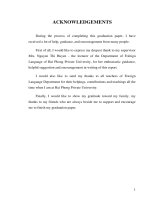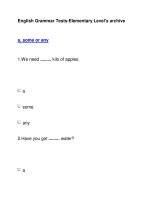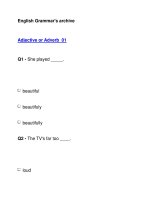Gerunds or present participles english grammar
Bạn đang xem bản rút gọn của tài liệu. Xem và tải ngay bản đầy đủ của tài liệu tại đây (10.36 KB, 1 trang )
Gerunds or present participles?
We can use -ing forms (e.g. drinking, singing, smoking, running etc.) not only as verbs, but also like adjectives,
adverbs or nouns.
You are drinking too much these days. (Here the -ing form is part of the present continuous verb.)
Barking dogs seldom bite. (Here the -ing form is used like an adjective. It modifies the noun dogs.)
She ran out of the room crying. (Here the -ing form is used like an adverb.)
Smoking is injurious to health. (Here the -ing form is used like a noun.)
When -ing forms are used as verbs, adjectives or adverbs, they are called present participles. Note that a
present participle can refer to the present, past or future.
When -ing forms are used like nouns, they are called gerunds.
Exercise
Point out the present participles and gerunds in the following sentences.
1. He has ruined his lungs by smoking.
2. Asking questions is easier than answering them.
3. We saw a clown standing on his head.
4. He hates spending money.
5. Waving their hands, the spectators cheered the runners.
6. We are fighting a losing battle.
7. It is freezing cold.
8. We are confident of winning the election.
9. The boy cried thinking that he would be whipped.
10. Can you teach me painting?
Answers
1. Smoking – Gerund (object of the preposition by)
2. Asking – Gerund (subject of the verb is)
3. Standing – participle (used like an adjective qualifying the noun clown)
4. Spending – gerund (object of the verb hates)
5. Waving – participle (used like an adjective qualifying the noun spectators)
6. Fighting – participle (used to form the present continuous verb)
7. Freezing – participle (used like an adverb qualifying the adjective cold)
8. Winning – gerund (object of the preposition of)
9. Thinking – Participle (used like an adverb qualifying the verb cried)
10. Painting – gerund (object of the verb teach)
Stay on top of your writing! Download our grammar guide from www.englishgrammar.org to stay up-to-date.
Powered by TCPDF (www.tcpdf.org)









